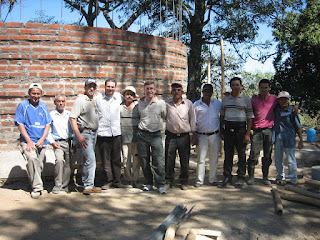Marvin

This is a picture of Marvin taken when I met him 6 years ago. It was easy to remember Marvin -- he was the boy who loved to jump on the bus with us when we were in his community. Yesterday, while working as a fare-taker on a bus, teen-ager Marvin was shot 7 times and killed instantly by a robber, becoming another victim of the senseless violence in El Salvador. I don't know what to say in the face of such tragedy -- not just the loss of Marvin, but the countless other sons and daughters of El Salvador, whose lives are cut short by criminal violence. Perhaps there is some hope to be found in these words of another victim of a murderer's bullet, archbishop Oscar Romero: No, brothers and sisters, El Salvador need not always live like this. “I will tear off the veil of shame that covers it among all peoples. I will wipe away the tears” of all those mothers who no longer have tears for having wept so much over their children who are not found. Here too will he take away the sorr...

